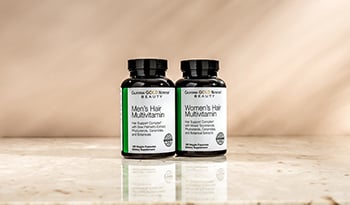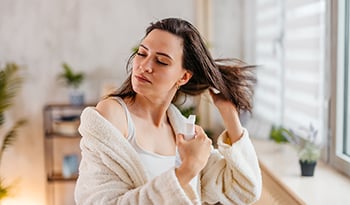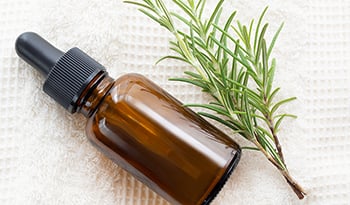Naturlige løsninger til en flassende, irriteret hovedbund

Gode nyheder! Du sidder ikke fast med tør, skællende, kløende eller irriteret hud i hovedbunden. Uanset om du har beskæftiget dig med dette problem i årevis, eller det er helt nyt for dig, har jeg evidensbaserede medicinske forslag, der kan hjælpe.
Almindelige årsager til skællende, irriteret hovedbund
Nogle af de vigtigste årsager til tør, irriteret hud i hovedbunden omfatter
- Du reagerer på et produkt, som du bruger på dit hår
- Du har lavt indhold af omega 3 fedtsyrer
- Du har allergi
- Du har en tilstand som eksem eller psoriasis
- Du oplever skæl
- Du har en mangel på mikronæringsstoffer
- Du bliver solbrændt
- Din hud har brug for mere beskyttelse
Få en professionel udtalelse
Det er virkelig værd at tage en tur til din læge for at få en officiel diagnose om, hvad der foregår med din unikke hudtilstand. De kan faktisk se på din hovedbund og køre de rigtige tests for at få dig den rigtige diagnose. Når du og din læge ved, hvad du har at gøre med, kan du udvikle en målrettet plan for at behandle det med succes. Der er for eksempel en forskel mellem de behandlinger, der vil helbrede eksem og behandlinger, der fjerner skæl. Du sparer penge og tid ved at sikre dig, at du forstår det sande problem, og at du behandler det rigtige. Når du ved det, eller hvis du har en fornemmelse, så tjek nogle af disse naturlige løsninger og lad mig vide, hvis de hjælper!
Naturlige løsninger til almindelige årsager til flassende, irriteret hud
Omega 3
Omega 3 fedtsyrer fugter huden indefra og ud. Fordi de udgør størstedelen af vores cellemembraner og lipidlag i vores hud, kan sunde fedtstoffer som omega 3 hjælpe med at holde huden fugtig, sund og intakt selv under barske forhold. Hvis du har mistanke om, at dit hovedbundsproblem simpelthen er tør hud, kan omega 3s hjælpe.
Der er en række muligheder for at øge dit daglige forbrug af omega 3 fedtsyrer. Disse inkluderer at spise mere chiafrø og hørfrø og indtage fisk som laks, ørred og sardiner. Derudover fås omega 3'er som kosttilskud i form af omega 3 væsker (jeg kan bedst lide torskeleverolie ), fiskeoliepillerog endda omega 3 gummier. Sigt efter at forbruge 1-6 gram om dagen afhængigt af din læges anbefaling. Hvis du har en blødnings- eller koagulationsforstyrrelse, skal du sørge for at chatte med din læge, før du øger dine omega 3s.
Hypoallergen shampoo og balsam
Tænk tilbage. Begyndte du at bruge en ny shampoo eller balsam lige før din hovedbund blev tør eller flassende? Det kan være muligt, at du reagerer på ingredienser i disse produkter. Allergiske eller følsomhedsreaktioner kan irritere huden, få den til at miste fugt og resultere i tørhed, rødme og irritation. Prøv at skifte dine hårprodukter til en hypoallergen shampoo og hypoallergen balsam for at se, om dette forbedrer din hovedbunds sundhed.
Derudover, hvis du flyttede til et nyt hjem eller begyndte at bade et nyt sted, før din hovedbunds sundhed ændrede sig, kan du prøve at tilføje et filter til dit brusehoved for at fjerne ingredienser, der kan irritere din hovedbund. Hvis alt andet fejler, skal du bede din hudlæge eller allergispecialist om at køre nogle allergitest for at sikre, at du ikke reagerer på nogen af de almindelige ingredienser i hårprodukter.
Badehætter
Det kan være, at du vasker dit hår for meget og fjerner din hovedbunds egne beskyttende olier under processen. Prøv at vaske dit hår hver anden dag for at se, om din hud forbedres. Du kan bruge en badehætte til at beskytte dit hår, mens du vasker resten af din krop.
Solcreme og hatte
Vidste du, at din hovedbund kan blive solbrændt? Dette overrasker de fleste mennesker, der aldrig er blevet lært at anvende solcreme eller bære en hat i solen. Solskoldning kan få huden til at virke rød og endda flager af det øverste lag af overhuden. Hvis du har bemærket, at din hud er rød efter at have tilbragt tid udenfor i solskinnet, skal du overveje, at du måske bliver solbrændt! Bær en hat udendørs og påfør solcreme på din hovedbund, når du påfører den på resten af din hud og se, om dette løser problemet.
Næringsstoffer og probiotika
Næringsstofmangel og dysbiose menes at bidrage til både eksem og psoriasis, som begge kan forekomme med skællende og irriteret hud. D-vitamin er et vigtigt næringsstof for hudens sundhed, og hvis du mangler, kan det bidrage til immunproblemer i huden. Bed din læge om at sikre dig, at du ikke er mangelfuld, og overvej at supplere med D-vitamin, hvis du ikke spiser nogen af de fødevarer, der indeholder højt D-vitamin regelmæssigt, som fed fisk, æg og mælk eller har et lavt serum-vitamin D-niveau.
Derudover er ubalancer i næringsstoffer som selen, kobberog zink almindelige hos mennesker med eksem. For at sikre, at du får nok af disse, skal du sørge for at indtage nok frugt, grøntsager, nødder, frø og proteinkilder hver dag samt et omfattende multivitamin og multimineral supplement. Du kan også tage et probiotisk supplement, der indeholder lactobacillus for at hjælpe med at tippe balancen i dit mikrobiom mod en, der giver mulighed for din sundeste hud.
Anti-inflammatorisk kost
Hudsygdomme som eksem og psoriasis er ofte forbundet med både blodsukkerdysfunktion og immundysfunktion, herunder fødevarefølsomhed. Ikke-cøliaki glutenfølsomhed er mere almindelig hos mennesker med psoriasis end dem uden det, for eksempel, ligesom blodsukkerproblemer. Heldigvis kan begge disse problemer forbedres ved at vedtage en antiinflammatorisk diæt som middelhavsdiet eller DASH-diæt. iHerb-bloggen har mange gode artikler om antiinflammatorisk kost inklusive middelhavsdiet! Spørg din læge, om de er okay med, at du prøver disse diæter i et par uger for at se, om de hjælper med at forbedre din hud.
Skælshampoo
Skæl kan være forårsaget af en overvækst af Malassezia-gær, der får huden til at blive skællet. Shampoo mod skæl kan hjælpe! De fleste mennesker kan prøve anti-skælshampoo i flere uger sikkert. Hvis det eliminerer hudafskalning, kan du føle dig ret sikker på, at skæl var synderen. Bonus: nu ved du, hvilket værktøj du skal bruge, hvis det kommer tilbage!
Fugtgivende hårmaske
En af de bedste kategorier af medicin (efter min mening) er medicinformen „kan ikke skade, kan hjælpe“. I dette tilfælde er det et godt middel at lave en hårmaske en eller to gange om ugen i et par minutter ad gangen. Det kan tilføje nogle blødgørende fugtholdige ingredienser til huden, hvilket hjælper med at mindske betændelse, reducere afskalning, hvis det er forårsaget af betændelse eller tørhed, og kan også forbedre glansen i dit hår.
Med tipsene i denne artikel kan du være på vej til en sundere hovedbund på ingen tid!
Referencer:
- Barilo AA; Smirnova SV. „[Ernæringsfaktorers rolle og fødevareallergi i udviklingen af psoriasis].“ Voprosy Pitaniia, bind 89, nr. 1, 2020, pubmed.ncbi.nlm.nih.gov/32083821/, 10.24411/0042-8833-2020-10002. Tilgået 2. juni 2021.
- Chen, Wangqing, m.fl. „Sporelementer Homeostatisk ubalance i psoriasis: En metaanalyse.“ Biologisk sporstofforskning, bind 191, nr. 2, 15. januar 2019, s. 313—322, pubmed.ncbi.nlm.nih.gov/30648223/, 10.1007/s12011-018-1626-1. Tilgået 2. juni 2021.
- Lugović-Mihić L; Seserko A; Duvancić T; Situm M; Mihić J. „[Histaminintolerance-mulige dermatologiske sekvenser].“ Acta Medica Croatica: Casopis Hravatske Akademije Medicinskih Znanosti, bind 66, nr. 5, 2012, pubmed.ncbi.nlm.nih.gov/23814966/,. Tilgået 2. juni 2021.
- Schwalfenberg, Gerry K. „En gennemgang af D-vitaminets kritiske rolle i immunsystemets funktion og de kliniske implikationer af vitamin D-mangel.“ Molekylær ernæring og fødevareforskning, bind 55, nr. 1, 7. september 2010, s. 96—108, pubmed.ncbi.nlm.nih.gov/20824663/, 10.1002/mnfr.201000174. Tilgået 2. juni 2021.
- Wacewicz, Marta, m.fl. „Koncentration af selen, zink, kobber, Cu/Zn-forhold, total antioxidantstatus og C-reaktivt protein i serum hos patienter med psoriasis behandlet med smalbånds ultraviolet B-fototerapi: En casekontrolundersøgelse.“ Tidsskrift for sporstoffer i medicin og biologi, bind. 44, december 2017, s. 109—114, pubmed.ncbi.nlm.nih.gov/28965564/, 10.1016/j.jtemb.2017.06.008. Tilgået 2. juni 2021.
ANSVARSFRASKRIVELSE: Wellness Hub har ikke til hensigt at stille diagnoser...

















































































 Indholdsfortegnelse
Indholdsfortegnelse















